---------------------------------------------------------
If you own chickens, you are familiar with the term “chicken math”. At first, you are only going to get 3 hens and then before you know it you have 13. It’s not because of accidental chicken breeding, but because adding new, cool breeds of chickens is addicting!
Well, I can tell you “duck math” is also alive and well. There may not be as many cool breeds of ducks as there are chicken breeds, but I have to say the ducks have wiggled their way into my heart. Their hilarious antics and sweet nature just make you want to get more.
Adding new ducks is usually easy
Luckily, adding new ducks to your flock is not as stressful and time-consuming as adding new chickens. Chickens have a strict pecking order in their flocks that rules every aspect of their day from who gets the choicest treats to who get the best roost space. They are constantly jockeying for a better position in the order so they don’t usually take kindly to new additions.
Ducks also have a pecking order but it isn’t as strict so making new additions isn’t as stressful to them. They may not mind more guests at the pool party, but especially if you are introducing ducklings to an adult flock that has a drake you want to ease everyone into the idea.
If you have an all-female flock of adult ducks and introduce ducklings this is usually the easiest with the least drama. It’s best to wait until ducklings are at least 6 weeks old and at least partially feathered out to start making introductions.
Drakes can make introductions difficult
Drakes will be most territorial to newcomers during mating season (spring and summer). Of course, this is also when feed stores are flooded with sweet little ducklings, so it is when you are most likely to be making additions.
A drake will also be more aggressive if you are trying to add another adult drake. Before you add another drake, make sure you will have at least 3-4 female ducks per drake to minimize fighting.
Additionally, your existing females might also get aggressive if there is a drake present. They might want to make sure the newcomers know this is HER drake.
If you have a drake in the flock, I would recommend waiting until the ducklings are over 8 weeks old to begin introductions. If your drake is attempting to mate with female ducks under 16 weeks old he should be separated until the younger ducks are full grown.
Note that if you have a drake (or occasionally a very bossy female) in your flock, each step below will likely take longer. Do not move on to the next steps until you see signs that your drake is behaving. Chasing new ducks away is fine, attacking them is not and a sign you need to go back a step.
Step 1 – Initial Meetings Days 1,2, & 3
The first couple of times you introduce the new ducks to the older ducks it should be on neutral ground. Free-ranging in the yard is a great place for the initial meeting. There will be plenty of room to run away if needed and the older ducks hopefully won’t feel as threatened. Stand nearby as they check each other out and be ready to break up a fight just in case. Ducks are super inquisitive by nature so they will want to investigate these newcomers.
Some positive body language to look for includes head bobbing up and down and excited quick quacking. This is a duck greeting, a way to say “hi, who are you?”. You will know negative body language when you see it. The older ducks will run at the new ducks with their head lowered, using their necks to try and push over the ducklings. If this happens, I would stay close, but try to let them work it out. Step in if the ducklings seem overly stressed or if the older ducks start biting. I would stage these initial meetings once a day for maybe 15 minutes each for 3 days in a row.
Step 2 – Safe Cohabitation Days 4, 5, & 6
After the ducks have met a couple of times, the next step is to bring the new ducklings out for full days. You most likely do not have the time to sit outside watching over the interactions so you will want to create a wire barrier between the old and new ducks. This way they can see, hear and smell each other but no one can get hurt while you aren’t watching.
If your older ducks free range in the yard during the day, you can try securing the ducklings in the duck run while the big ducks are out in the yard. Alternatively, you can section off part of your run with some chicken wire. This lets the ducklings get used to their new home outside of the brooder and the old ducks get used to the idea of new ducks living in their space.
I usually bring the ducklings back inside the house at night. After a couple of days doing this, we move to Step 3.
An alternative in step 2 is if you have an older gentle duck you can add the nice adult duck in with the ducklings in the run. Let them all bond together for a couple of days before setting them free with the whole flock.
Step 3 – Overnight Visits Days 7, 8, & 9
Next, you want to let the ducklings spend the night outside. Section off your duck sleeping area so you have two separate spaces. Be sure where ever you have your ducks sleeping is predator-proof Preferably it is somewhere the old and new ducks can see each other the whole night but can’t get to each other. During the daytime on these days, you should be putting the ducklings into their separate daytime area that you used in step 2. After a couple of nights of sleepovers, it’s time for the final step!
Step 4 – Full Fledged Friends Day 10
The last step is to let the old and new flocks merge. Let them all out to free range or into the run, hold your breath, and hope everyone behaves! Try to make this happen on a day when you will be home all day so you can keep an eye on things. Hang out with them for 15 minutes or so, if it seems like everyone is being cool, you can go about your business. Try to stay close and make frequent check-ins. Definitely keep a closer eye on any drakes to make sure they aren’t being bullies and make sure you have plenty of food & water available so they aren’t fighting over resources.
That’s it! In another week or so, you will never even know to look at them that they were ever anything other than a big, quacky family 🙂 Keep in mind that just like humans, ducks have their own personalities. Sometimes it takes hours for new ducks to decide they like each other – sometimes it is weeks or even months.
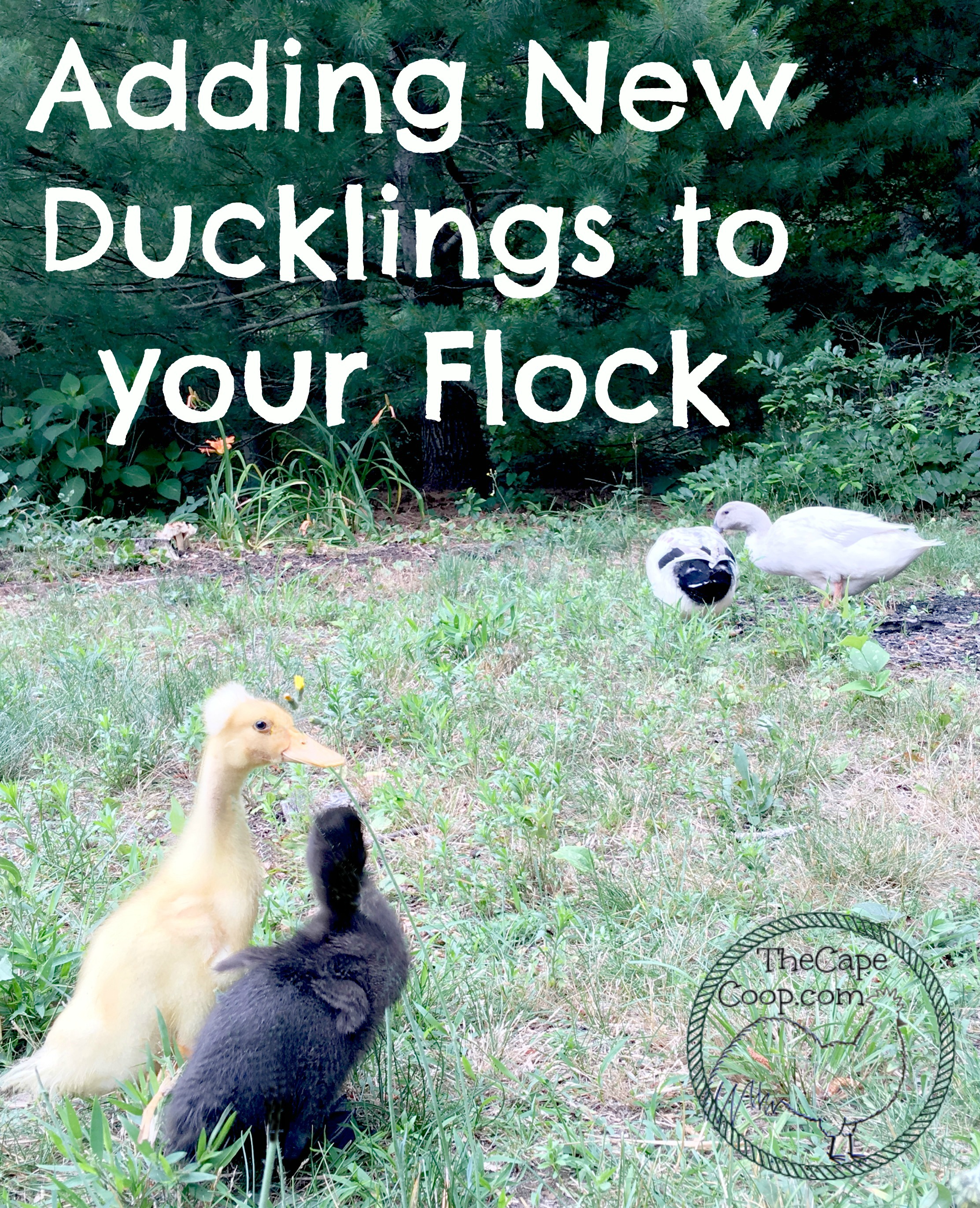

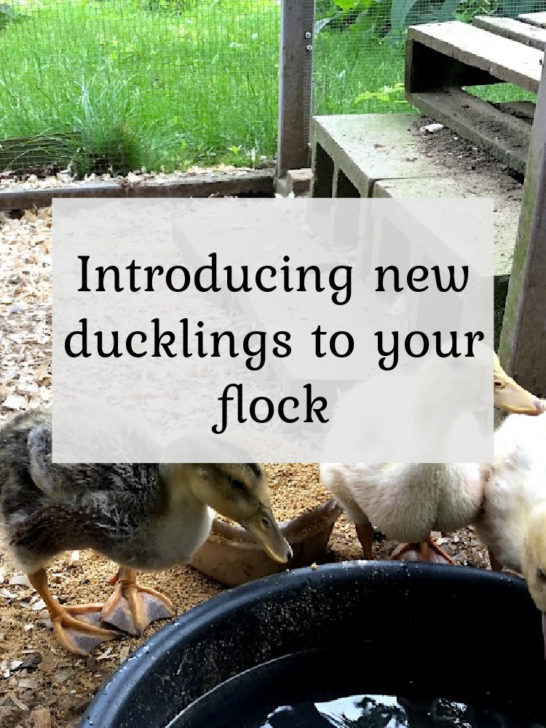

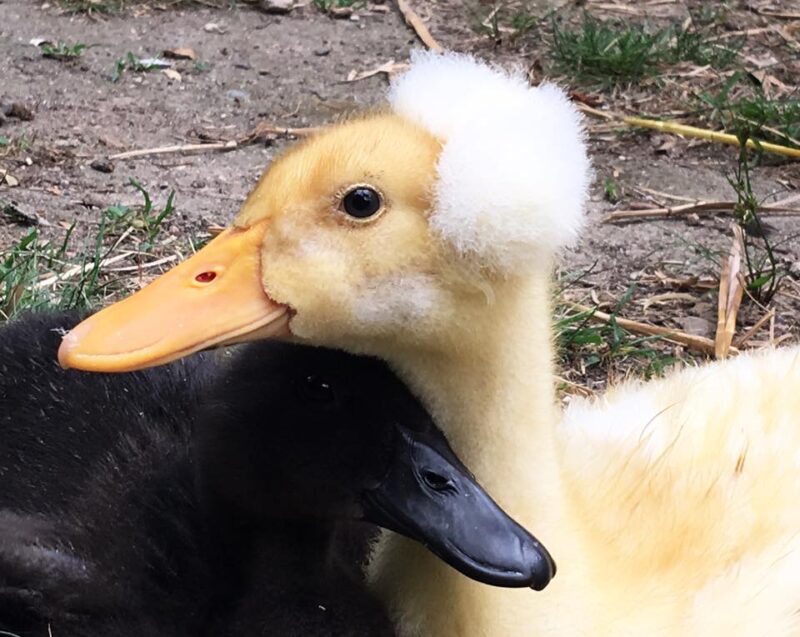
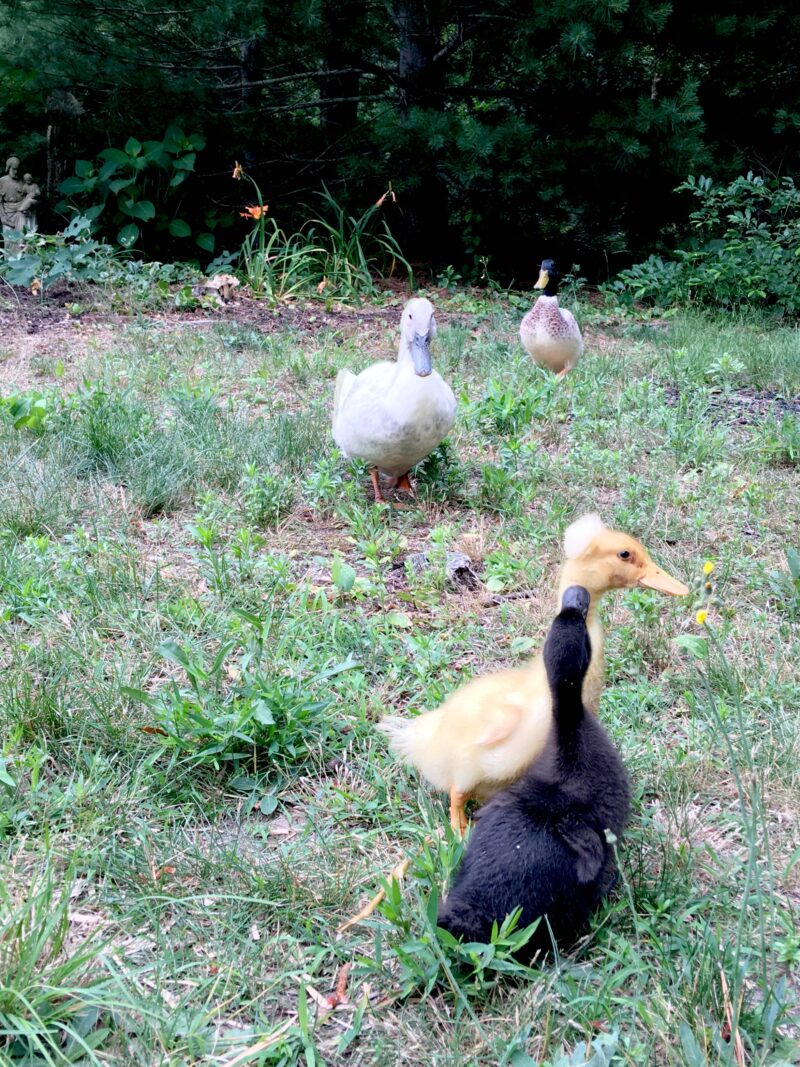
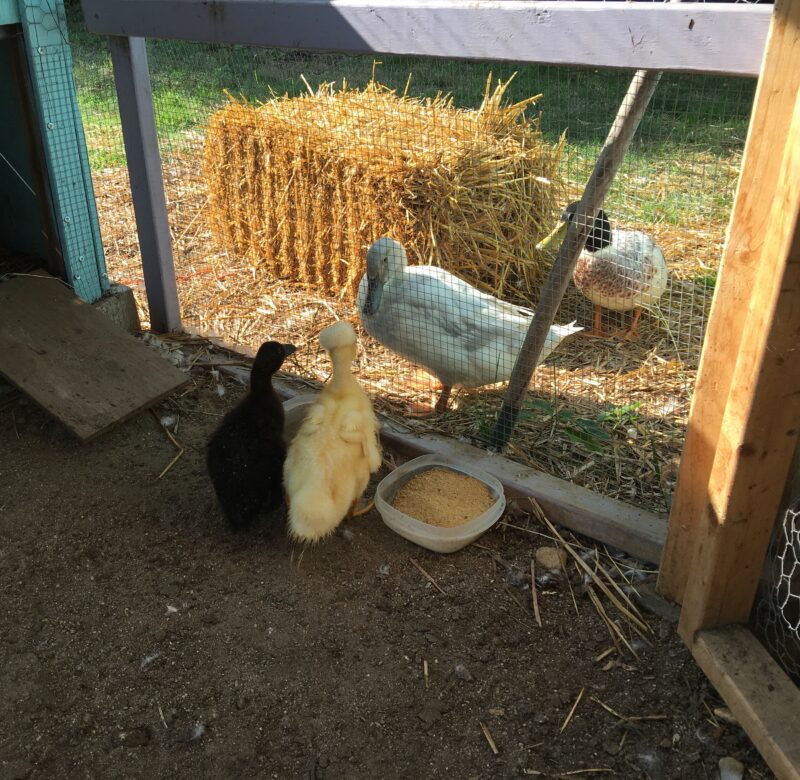

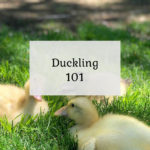

Debbie Fleischer
Monday 11th of September 2023
My drake keeps attacking the 3 month old ducklings. I have them in separate pens from the adult hen and drake. The few times he's gotten in with them, he starts going for their head. Looks like he's biting, but no wounds. I break them up and chase him out. They've seen each other thru the pen arms when I put the babies in the run. Babies are afraid of him. The hen doesn't seem to care, but she and the drake are a pair so I don't want to break them up. She sat on eggs and had a couple hatch. One died and the other I saved and raised and got 3 more babies to be with her. I'd appreciate any suggestions.
Liz
Monday 11th of September 2023
I would first try letting just the hen in with the ducklings for a few days. If you can get the female to bond with the new ducks it will be easier for the drake to accept them. BUT separating the drake and hen could just cause the hen to be so upset about not being with her drake that she can't concentrate on anything else. It's worth trying anyway. If that won't work then it might just be time to let them work it out. Most of the time when a drake is in the flock there is fighting when you introduce new ducks. Ducks need to work out their pecking order in their own way. At 3 months old, your ducklings are old enough for a little light "bullying". It's a good sign that all you have seen is nipping with no wounds. It's the drakes way of establishing that he is in charge. Nipping and chasing is normal, as is a little neck wrestling. If there are wounds or some birds are not allowed to access the food and water then you should step in (but it helps if you have multiple feed & water containers). It can be really hard to watch but hopefully it shouldn't last more than a few days. Good luck!
Debbie Fleischer
Monday 7th of August 2023
I have 6 week old ducklings. I've been putting them out side but always in a pen, where the adult male and female can't get them. Today they were out of the pen for the first time. One of the little hens looks like a mallard. My drake chased a wild pair of mallards away from our pond this spring. Today he tried to bite the little mallard hen. I pushed him away with my chicken oar. He wasn't after any of the others. It's really time for them to be out in the pen. They have feathers and seem big enough. I'm going to supervise very close for a few days. Do you have any suggestions? I don't know what to do. He's always been a good duck and he and my female have been together for a couple years. They're the only ducks, the rest are chickens. Haven't had any problems with him.
Liz
Wednesday 9th of August 2023
Drakes can be strange and territorial when introducing ducklings weather they are from a hatchery or even his own. It's not usual for drakes to chase all of them or even single one out like your guy is doing (although it could be possible that little one is a male, they don't get their adult coloring until about 10-12 weeks). Unfortunately there isn't much you can do to make him get used to it. If all he is doing is chasing them it's ok, they need to work that out. But if he is biting them or trying to mount them that can be dangerous and might just need to keep them separated a little longer. You also want to be sure he isn't blocking the duckling's access to food & water. Good luck! Hopefully he will get used to it soon
Cassie
Friday 4th of August 2023
I have some little over 3 month old Pekins and some maybe month old Blue Swedish. I let them out together when I can supervise to free roam and one of the males will charge them (but not make contact) and the female will chase them away (mostly just approaching them quickly and scaring them off from the mud hole, etc (for a few seconds... the ducklings are persistent). She's about as adamant as one of our drakes. She is the only female Pekin with 5 drakes, which is one reason we got more ducks, so she wasn't the only female. She does kind of run the show with the boys though so I guess I'm not too surprised at her reaction to the new ducklings
Gary
Friday 23rd of June 2023
What do you feed your ducks?
Liz
Wednesday 28th of June 2023
When I have ducklings I use Manna Pro Duckling starter. My full grown ducks eat Nature Wise Layer Crumbles
Sharon D Drumm
Monday 10th of April 2023
Hi! I have a week old female buff whose sister unfortunately died shortly after arriving with us. I have 2 more on the way. When they arrive, the 2 new will be a week younger than our current duckling. We have been trying to strike a good balance between comforting the lonely chick and not handling her too much lest she develop separation anxiety when we put them outside. We have put mirrors and stuffies in her brooder, play chick sounds, and visit with her frequently. I'll tell you what - they definitely want and need company! the others can't get here soon enough!! My question is do you think when the new ducklings arrive the existing duckling will accept them okay? anything I should do to encourage their bonding?
Liz
Monday 10th of April 2023
Awww sounds like you are doing everything right! Poor little one, they really don't like being alone. We actually had the same situation last year but with goslings. It took us 3 weeks to be able to get more goslings so she wouldn't be alone. Geese & ducks both grow SUPER fast - so the size difference will be a little shocking when the little ones arrive, but most likely the older duckling will be so happy to have other ducklings to hang with the bonding should be pretty quick. And the little ones will catch up quickly in size. Our little gosling immediately took to her two new sisters, it was very sweet. Good luck!